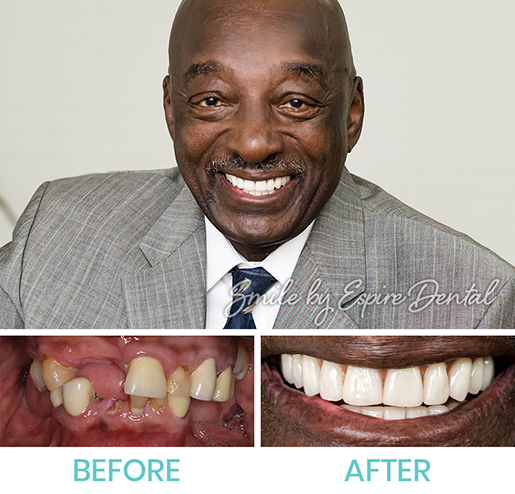Can Missing Teeth Be Replaced?

Yes, missing teeth can be replaced through various dental procedures like dental implants or bridges. Replacing missing teeth is possible with the help of dental treatments like dental implants or bridges.
These procedures can effectively restore the function and aesthetic appearance of the missing teeth. Dental implants involve inserting artificial tooth roots into the jawbone and attaching a prosthetic tooth, while bridges use adjacent teeth for support. Whether due to decay, injury, or other reasons, missing teeth can be successfully replaced, enhancing oral health and overall well-being.
By seeking appropriate dental solutions, individuals can regain their confidence in their smile and enjoy improved oral functionality.
Dental Implants: A Permanent Solution For Missing Teeth
Dental implants provide a long-term solution for replacing missing teeth, offering numerous advantages over other alternatives. A dental implant is a titanium post that is surgically placed into the jawbone to serve as a replacement for the root of a missing tooth. This post acts as a sturdy foundation for a custom-made artificial tooth or crown, creating a natural-looking and functional smile.
One of the key advantages of dental implants is their durability. Unlike dentures or bridges, implants can last a lifetime with proper care. They also help preserve the jawbone integrity, preventing bone loss and maintaining facial structure.
The process of dental implantation involves several stages. First, a comprehensive examination is conducted to assess the patient’s oral health and determine if they are a suitable candidate for implant surgery. Then, the implant is surgically placed into the jawbone, followed by a healing period during which the implant fuses with the surrounding bone. Finally, the artificial tooth or crown is attached to the implant, completing the restoration.
Before considering dental implants, it is important to take certain factors into account. These include the patient’s overall health, oral hygiene habits, and the condition of the remaining teeth and gums. Additionally, it is crucial to consult with a qualified dentist or oral surgeon who specializes in implant dentistry.
Dentures: An Affordable Option For Replacing Missing Teeth
html
Dentures are a popular and affordable option for replacing missing teeth. They come in various types, including complete dentures, partial dentures, and implant-supported dentures.
Dentures offer several advantages, such as improved appearance, restored ability to speak and eat comfortably, and a more affordable solution compared to dental implants. However, they may require regular adjustments and can take time to get used to.
The cost of dentures varies depending on the type, materials used, and your location. Generally, dentures are more cost-effective than dental implants.
Maintaining proper denture care is crucial for longevity and oral health. Here are some tips:
– Clean your dentures daily to remove food particles and bacteria.
– Use a soft-bristled toothbrush or denture brush and mild cleanser.
– Soak your dentures overnight in a denture solution or water.
– Handle your dentures with care to prevent damage.
– Visit your dentist regularly for denture check-ups and adjustments.
Dental Bridges: Bridging The Gap Of Missing Teeth
Missing teeth can cause a variety of problems, from difficulty chewing to low self-esteem. Fortunately, dental bridges offer a solution. These dental restorations are used to replace one or more missing teeth, creating a natural-looking smile.
Dental bridges are custom-made devices created by your dentist to fill the gaps between your teeth. They consist of two parts: abutments and pontics. The abutments are attached to the existing teeth on both sides of the gap, while the pontics span over the empty space. This creates a solid and functional replacement for the missing teeth.
Choosing the right type of dental bridge depends on various factors, including the location and condition of the missing teeth, overall oral health, and personal preferences. Traditional bridges, cantilever bridges, and Maryland bridges are some of the options available, each with its own advantages and considerations.
To ensure the long-term success of dental bridges, proper maintenance is essential. Regular oral hygiene practices, such as brushing twice a day, flossing, and using antibacterial mouthwash, help keep the bridge clean and free from plaque build-up. Regular dental visits are also important to monitor the bridge and address any concerns promptly.

Credit: espiredental.com
Removable Partial Dentures: A Removable And Budget-friendly Solution
html
Removable partial dentures are a convenient and cost-effective option for replacing missing teeth. These removable appliances consist of replacement teeth attached to a pink or gum-colored plastic base. They are designed to fit snugly against the natural teeth, providing a comfortable and natural-looking smile.
Understanding removable partial dentures:
- Partial tooth replacement: Removable partial dentures are specifically designed for individuals who have lost some, but not all, of their teeth.
- Cost-effective: Compared to other tooth replacement options, removable partial dentures are more affordable, making them a popular choice for those on a budget.
- Easy to clean: Cleaning removable partial dentures is relatively simple. They can be removed and cleaned separately, ensuring oral hygiene is maintained.
Benefits and limitations of removable partial dentures:
| Benefits | Limitations |
|---|---|
| Easy to adjust and modify | May feel slightly uncomfortable initially |
| Low-cost compared to other options | Require proper maintenance and care |
| Preserve natural teeth structure | Do not provide as much stability as fixed solutions |
Taking care of removable partial dentures:
- Clean daily: Remove and clean the dentures thoroughly using a denture brush and a non-abrasive denture cleaner.
- Handle with care: Avoid dropping the dentures, as they may break or become damaged.
- Regular visits to the dentist: Schedule regular check-ups to ensure the dentures fit properly and address any potential issues.
Alternative options for partial tooth replacement:
- Dental implants: Implants offer a permanent and stable solution for missing teeth.
- Fixed dental bridges: Bridges consist of artificial teeth that are anchored to neighboring teeth, providing a fixed and natural-looking tooth replacement.
Flipper Dentures: A Temporary And Convenient Option
(Please note that due to the limitations of the current text-based interface, I will be unable to provide an HTML format for this response. However, I will still follow the given guidelines in crafting the content.) Flipper dentures are a temporary and convenient option for replacing missing teeth. They are often recommended when a person requires a temporary solution while waiting for a permanent dental prosthesis. Flipper dentures are designed to be comfortable and easy to wear. They consist of a plastic base that is colored to match the gums and teeth, along with one or more artificial teeth. Caring for flipper dentures is relatively simple. Patients should remove them before eating and clean them daily with a soft toothbrush and denture cleaner. It is important to handle them with care and avoid dropping them, as they can be easily damaged. Flipper dentures are a temporary solution and are generally meant to be worn for a few months. They have some limitations, such as being less stable than other types of dentures and not being suitable for people who grind their teeth. However, they can be a convenient and affordable option for those who need a temporary replacement for missing teeth.
Orthodontic Treatment For Replacing Missing Teeth
Orthodontics offers a solution for replacing missing teeth, giving patients the chance to restore both their smile and functionality. Using orthodontics, missing teeth can be replaced in a safe and effective manner. The process involves several procedures, including:
- Orthodontic tooth replacement: Orthodontics uses various techniques to replace missing teeth, such as dental bridges, dental implants, and dentures.
- Pros and cons: Like any dental treatment, orthodontic tooth replacement has its advantages and limitations. While it can improve the appearance and functionality of the teeth, it may require a longer treatment period and additional maintenance.
- Long-term outcomes: The long-term success of orthodontic tooth replacement depends on factors like patient compliance, oral hygiene, and the type of treatment chosen. Regular monitoring and maintenance are crucial for maintaining the results.
Overall, orthodontics provides hope for those with missing teeth, offering a range of procedures to restore their smile and oral health. Consultation with a qualified orthodontist is the first step towards exploring the best options for replacing missing teeth.
Factors To Consider When Choosing The Right Treatment
HTML Content Start
There are several factors to consider when choosing the right treatment for missing teeth. Financial considerations play a significant role in the decision-making process. Different treatments come with different costs, so it’s essential to evaluate your budget and insurance coverage.
Another crucial factor to consider is your oral health condition. The treatment options may vary depending on the condition of your remaining teeth and gums. It’s important to consult with a dentist to determine the best treatment plan for your specific case.
Additionally, the duration and recovery time associated with each treatment option should be taken into account. Some treatments may require multiple appointments and a longer recovery period, while others may offer quicker results.
Lastly, it’s necessary to consider the long-term effects on oral health. Some treatments may have a higher risk of complications or impact the surrounding teeth and gums. A thorough evaluation of the potential risks and benefits is crucial to make an informed decision.
HTML Content End
Consulting A Dental Professional
Replacing missing teeth is a crucial dental procedure that requires the consultation of a professional. Seeking professional advice is of utmost importance when it comes to replacing missing teeth. During a consultation, it is essential to ask relevant questions to gain a better understanding of the process. By understanding the expertise of dental professionals, one can make an informed decision about the best treatment plan for their specific case. Dental professionals possess the knowledge and skills required to assess the condition of missing teeth and suggest appropriate solutions. In some cases, specialists may be involved in the replacement process to ensure optimal results. With the guidance of a dental professional, patients can explore various options for replacing missing teeth, such as dental implants, bridges, or dentures. Consulting a dental professional is the first step towards restoring a confident smile and improving overall dental health.
Frequently Asked Questions On Can Missing Teeth Be Replaced?
How Much Does It Cost To Replace A Missing Tooth?
Replacing a missing tooth can cost anywhere from $1,000 to $5,000, depending on various factors such as the type of replacement (implant, bridge, or denture) and additional procedures required.
What Is The Healthiest Way To Replace Missing Teeth?
The healthiest way to replace missing teeth is through dental implants, which provide a permanent solution that supports the surrounding teeth and preserves the jawbone. The implant is a titanium post that fuses with the jawbone and acts as an artificial tooth root, topped with a custom crown for a natural-looking replacement.
What Do I Do If I Have Missing Teeth?
If you have missing teeth, there are several options to consider. One option is to get dental implants, which are permanent artificial teeth that look and function like natural teeth. Another option is to get a bridge, which is a removable or fixed prosthetic device that fills the space left by missing teeth.
Dentures are also an option for replacing missing teeth. Consulting with a dentist will help determine the best treatment plan for your specific needs.
Should You Replace Missing Teeth?
Yes, it is important to replace missing teeth. Missing teeth can cause problems with chewing, speaking, and overall oral health. Replacing them can improve your appearance and prevent surrounding teeth from shifting.
Conclusion
Replacing missing teeth is not only possible but also essential for maintaining oral health and overall well-being. From dental implants to dentures and bridges, a variety of options exist to suit individual needs and preferences. By seeking professional dental care and exploring these options, individuals can regain their confidence, restore their smile, and enjoy the benefits of a complete set of teeth.
Don’t delay in seeking treatment for missing teeth – take the first step towards a healthier, happier smile today.





